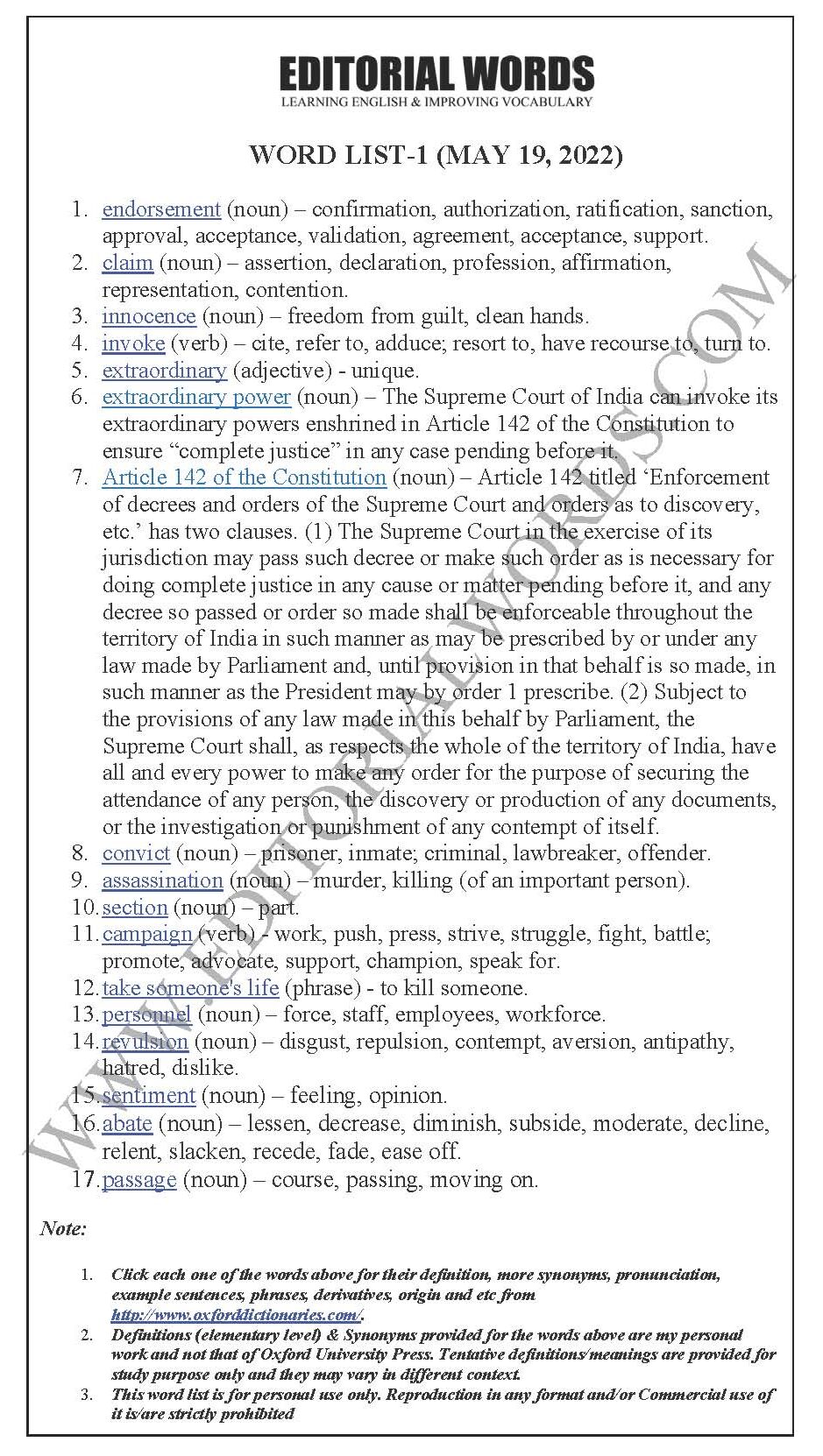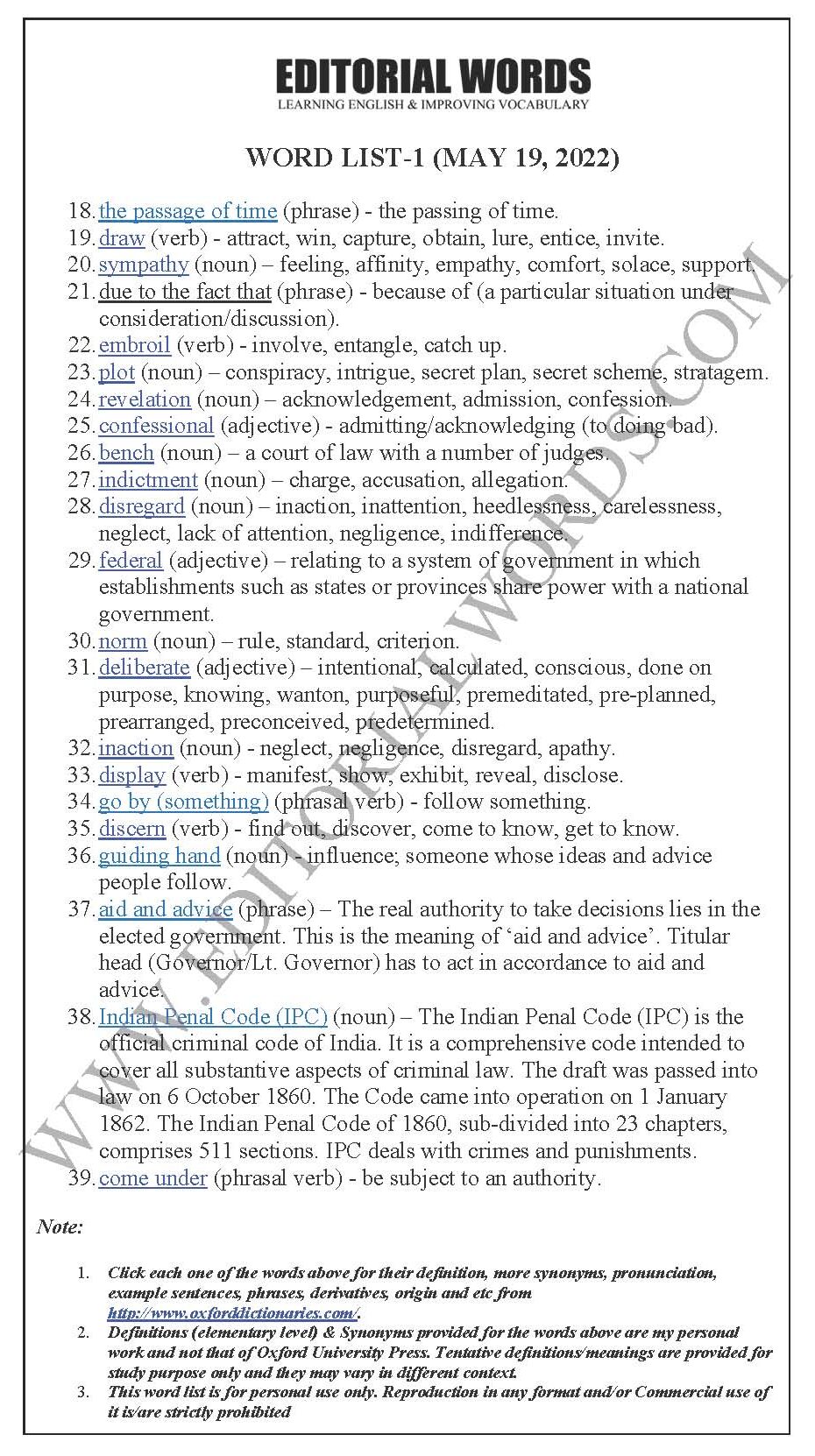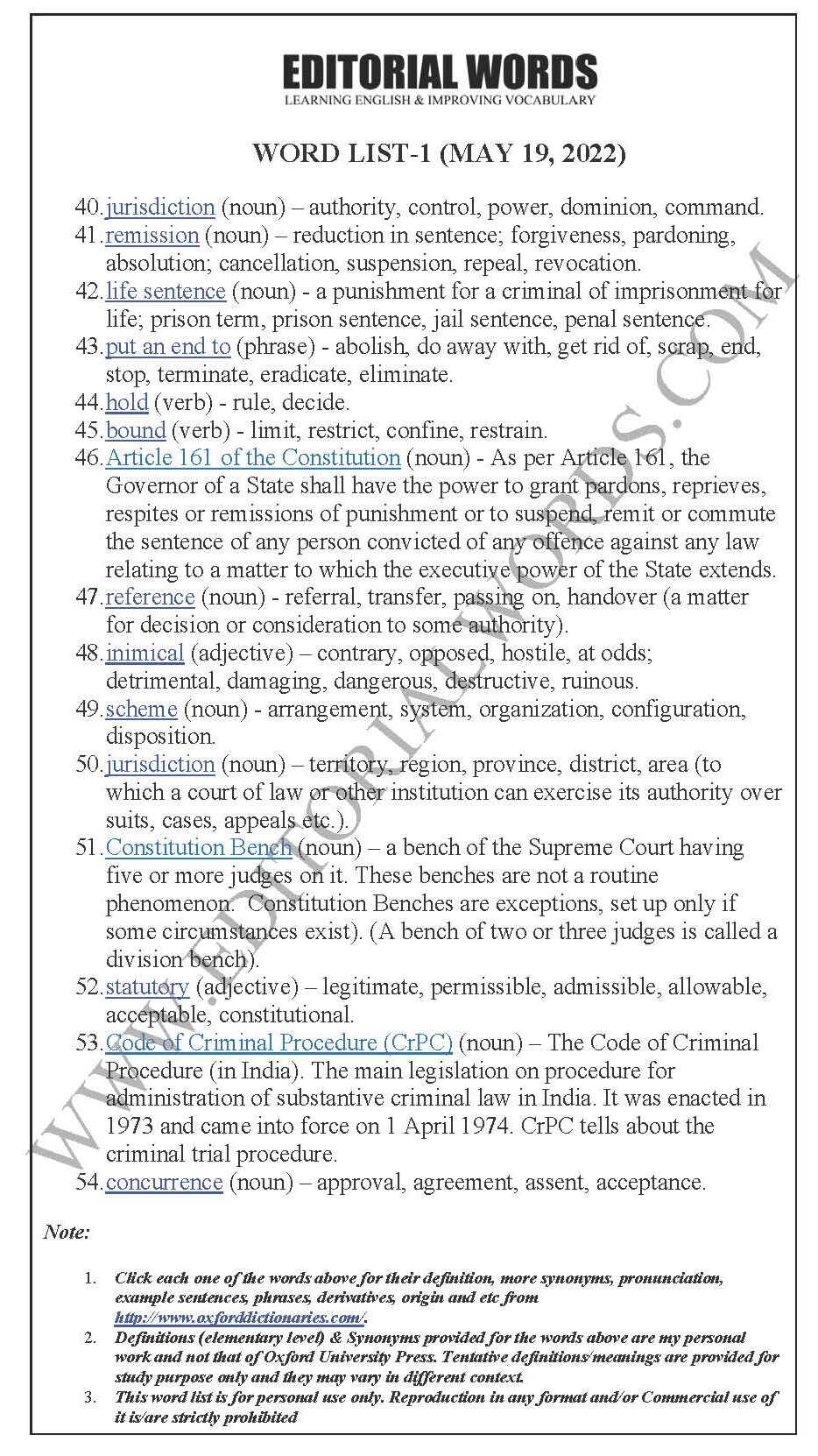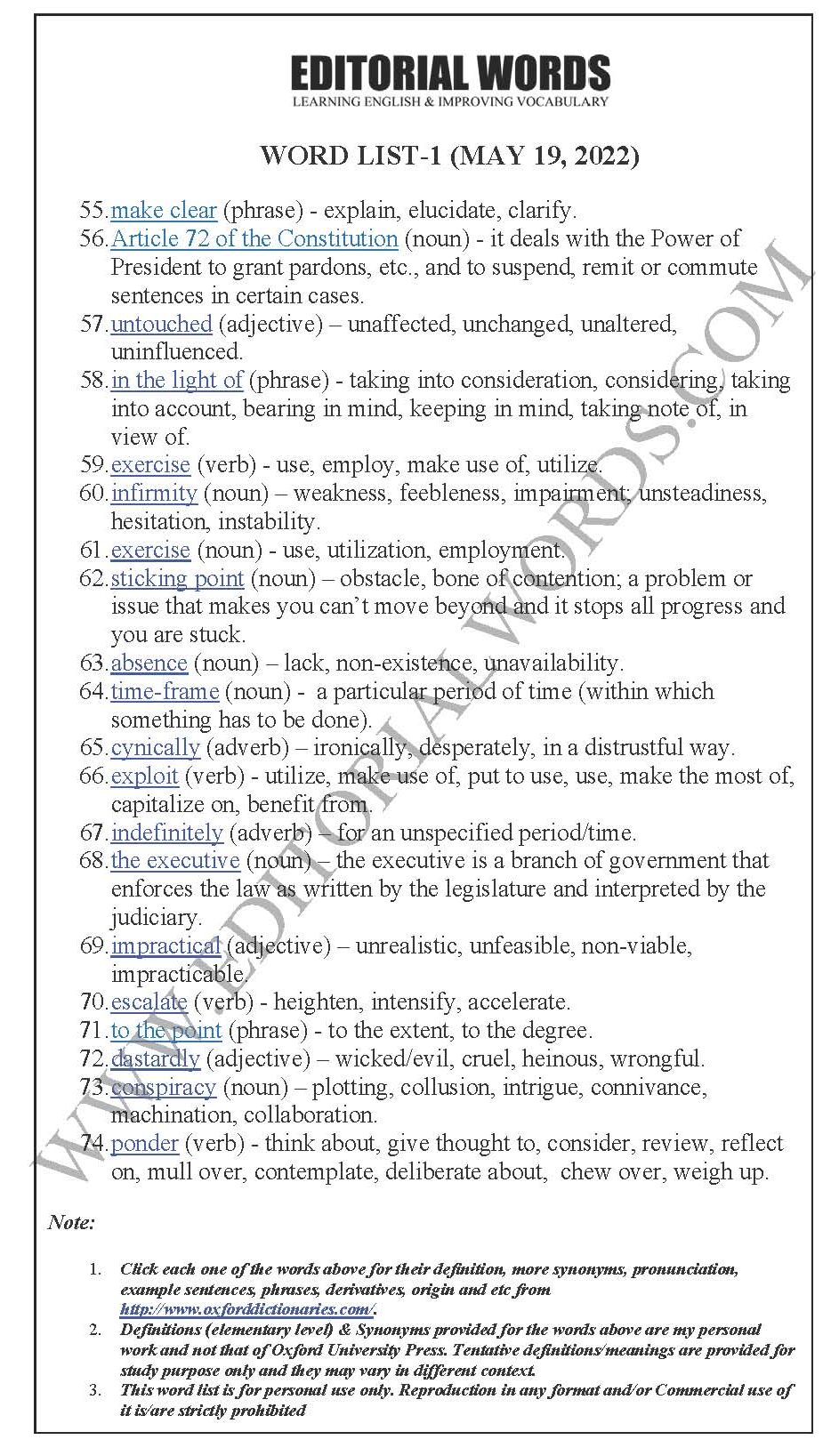The Hindu Editorial (Law and public opinion) – May 19, 2022
The Supreme Court has invoked its extraordinary power to order the release of A.G. Perarivalan, one of the seven convicts in the Rajiv Gandhi assassination case, for whose freedom his mother,… For further reading, visit “The Hindu”. Below is today’s word list-1 for The Hindu Editorial (Law and public opinion) – May 19, 2022.
To read this article, click “The Hindu”.
This preview is provided here with permission.
Courtesy: The Hindu
The Hindu Editorial (Law and public opinion) – May 19, 2022:
- endorsement (noun) – confirmation, authorization, ratification, sanction, approval, acceptance, validation, agreement, acceptance, support.
- claim (noun) – assertion, declaration, profession, affirmation, representation, contention.
- innocence (noun) – freedom from guilt, clean hands.
- invoke (verb) – cite, refer to, adduce; resort to, have recourse to, turn to.
- extraordinary (adjective) – unique.
- extraordinary power (noun) – The Supreme Court of India can invoke its extraordinary powers enshrined in Article 142 of the Constitution to ensure “complete justice” in any case pending before it.
- Article 142 of the Constitution (noun) – Article 142 titled ‘Enforcement of decrees and orders of the Supreme Court and orders as to discovery, etc.’ has two clauses. (1) The Supreme Court in the exercise of its jurisdiction may pass such decree or make such order as is necessary for doing complete justice in any cause or matter pending before it, and any decree so passed or order so made shall be enforceable throughout the territory of India in such manner as may be prescribed by or under any law made by Parliament and, until provision in that behalf is so made, in such manner as the President may by order 1 prescribe. (2) Subject to the provisions of any law made in this behalf by Parliament, the Supreme Court shall, as respects the whole of the territory of India, have all and every power to make any order for the purpose of securing the attendance of any person, the discovery or production of any documents, or the investigation or punishment of any contempt of itself.
- convict (noun) – prisoner, inmate; criminal, lawbreaker, offender.
- assassination (noun) – murder, killing (of an important person).
- section (noun) – part.
- campaign (verb) – work, push, press, strive, struggle, fight, battle; promote, advocate, support, champion, speak for.
- take someone’s life (phrase) – to kill someone.
- personnel (noun) – force, staff, employees, workforce.
- revulsion (noun) – disgust, repulsion, contempt, aversion, antipathy, hatred, dislike.
- sentiment (noun) – feeling, opinion.
- abate (noun) – lessen, decrease, diminish, subside, moderate, decline, relent, slacken, recede, fade, ease off.
- passage (noun) – course, passing, moving on.
- the passage of time (phrase) – the passing of time.
- draw (verb) – attract, win, capture, obtain, lure, entice, invite.
- sympathy (noun) – feeling, affinity, empathy, comfort, solace, support.
- due to the fact that (phrase) – because of (a particular situation under consideration/discussion).
- embroil (verb) – involve, entangle, catch up.
- plot (noun) – conspiracy, intrigue, secret plan, secret scheme, stratagem.
- revelation (noun) – acknowledgement, admission, confession.
- confessional (adjective) – admitting/acknowledging (to doing bad).
- bench (noun) – a court of law with a number of judges.
- indictment (noun) – charge, accusation, allegation.
- disregard (noun) – inaction, inattention, heedlessness, carelessness, neglect, lack of attention, negligence, indifference.
- federal (adjective) – relating to a system of government in which establishments such as states or provinces share power with a national government.
- norm (noun) – rule, standard, criterion.
- deliberate (adjective) – intentional, calculated, conscious, done on purpose, knowing, wanton, purposeful, premeditated, pre-planned, prearranged, preconceived, predetermined.
- inaction (noun) – neglect, negligence, disregard, apathy.
- display (verb) – manifest, show, exhibit, reveal, disclose.
- go by (something) (phrasal verb) – follow something.
- discern (verb) – find out, discover, come to know, get to know, understand.
- guiding hand (noun) – influence; someone whose ideas and advice people follow.
- aid and advice (phrase) – The real authority to take decisions lies in the elected government. This is the meaning of ‘aid and advice’. Titular head (Governor/Lt. Governor) has to act in accordance to aid and advice.
- Indian Penal Code (IPC) (noun) – The Indian Penal Code (IPC) is the official criminal code of India. It is a comprehensive code intended to cover all substantive aspects of criminal law. The draft was passed into law on 6 October 1860. The Code came into operation on 1 January 1862. The Indian Penal Code of 1860, sub-divided into 23 chapters, comprises 511 sections. IPC deals with crimes and punishments.
- come under (phrasal verb) – be subject to an authority.
- jurisdiction (noun) – authority, control, power, dominion, command.
- remission (noun) – reduction in sentence; forgiveness, pardoning, absolution; cancellation, suspension, repeal, revocation.
- life sentence (noun) – a punishment for a criminal of imprisonment for life; prison term, prison sentence, jail sentence, penal sentence.
- put an end to (phrase) – abolish, do away with, get rid of, scrap, end, stop, terminate, eradicate, eliminate.
- hold (verb) – rule, decide.
- bound (verb) – limit, restrict, confine, restrain.
- Article 161 of the Constitution (noun) – As per Article 161, the Governor of a State shall have the power to grant pardons, reprieves, respites or remissions of punishment or to suspend, remit or commute the sentence of any person convicted of any offence against any law relating to a matter to which the executive power of the State extends.
- reference (noun) – referral, transfer, passing on, handover (a matter for decision or consideration to some authority).
- inimical (adjective) – contrary, opposed, hostile, at odds; detrimental, damaging, dangerous, destructive, ruinous.
- scheme (noun) – arrangement, system, organization, configuration, disposition.
- jurisdiction (noun) – territory, region, province, district, area (to which a court of law or other institution can exercise its authority over suits, cases, appeals etc.).
- Constitution Bench (noun) – a bench of the Supreme Court having five or more judges on it. These benches are not a routine phenomenon. Constitution Benches are exceptions, set up only if some circumstances exist). (A bench of two or three judges is called a division bench).
- statutory (adjective) – legitimate, permissible, admissible, allowable, acceptable, constitutional.
- Code of Criminal Procedure (CrPC) (noun) – The Code of Criminal Procedure (in India). The main legislation on procedure for administration of substantive criminal law in India. It was enacted in 1973 and came into force on 1 April 1974. CrPC tells about the criminal trial procedure.
- concurrence (noun) – approval, agreement, assent, acceptance.
- make clear (phrase) – explain, elucidate, clarify.
- Article 72 of the Constitution (noun) – it deals with the Power of President to grant pardons, etc., and to suspend, remit or commute sentences in certain cases.
- untouched (adjective) – unaffected, unchanged, unaltered, uninfluenced.
- in the light of (phrase) – taking into consideration, considering, taking into account, bearing in mind, keeping in mind, taking note of, in view of.
- exercise (verb) – use, employ, make use of, utilize.
- infirmity (noun) – weakness, feebleness, impairment; unsteadiness, hesitation, instability.
- exercise (noun) – use, utilization, employment.
- sticking point (noun) – obstacle, bone of contention; a problem or issue that makes you can’t move beyond and it stops all progress and you are stuck.
- absence (noun) – lack, non-existence, unavailability.
- time-frame (noun) – a particular period of time (within which something has to be done).
- cynically (adverb) – ironically, desperately, in a distrustful way.
- exploit (verb) – utilize, make use of, put to use, use, make the most of, capitalize on, benefit from.
- indefinitely (adverb) – for an unspecified period/time.
- the executive (noun) – the executive is a branch of government that enforces the law as written by the legislature and interpreted by the judiciary.
- impractical (adjective) – unrealistic, unfeasible, non-viable, impracticable.
- escalate (verb) – heighten, intensify, accelerate.
- to the point (phrase) – to the extent, to the degree.
- dastardly (adjective) – wicked/evil, cruel, heinous, wrongful.
- conspiracy (noun) – plotting, collusion, intrigue, connivance, machination, collaboration.
- ponder (verb) – think about, give thought to, consider, review, reflect on, mull over, contemplate, deliberate about, chew over, weigh up.
Note:
1. Click each one of the words above for their definition, more synonyms, pronunciation, example sentences, phrases, derivatives, origin and etc from http://www.oxforddictionaries.com/.
2. Definitions (elementary level) & Synonyms provided for the words above are my personal work and not that of Oxford University Press. Tentative definitions/meanings are provided for study purpose only and they may vary in a different context.
3. This word list is for personal use only. Reproduction in any format and/or Commercial use of it is/are strictly prohibited.
The Hindu Editorial (Law and public opinion) – May 19, 2022:




“Phrasal Verbs” We Learnt Last Week
“Idioms & Phrases” We Learnt Last Week
“Important Definitions” We Learnt Last Week
Recent Word Lists For The Hindu Editorial Articles

Be the first to comment